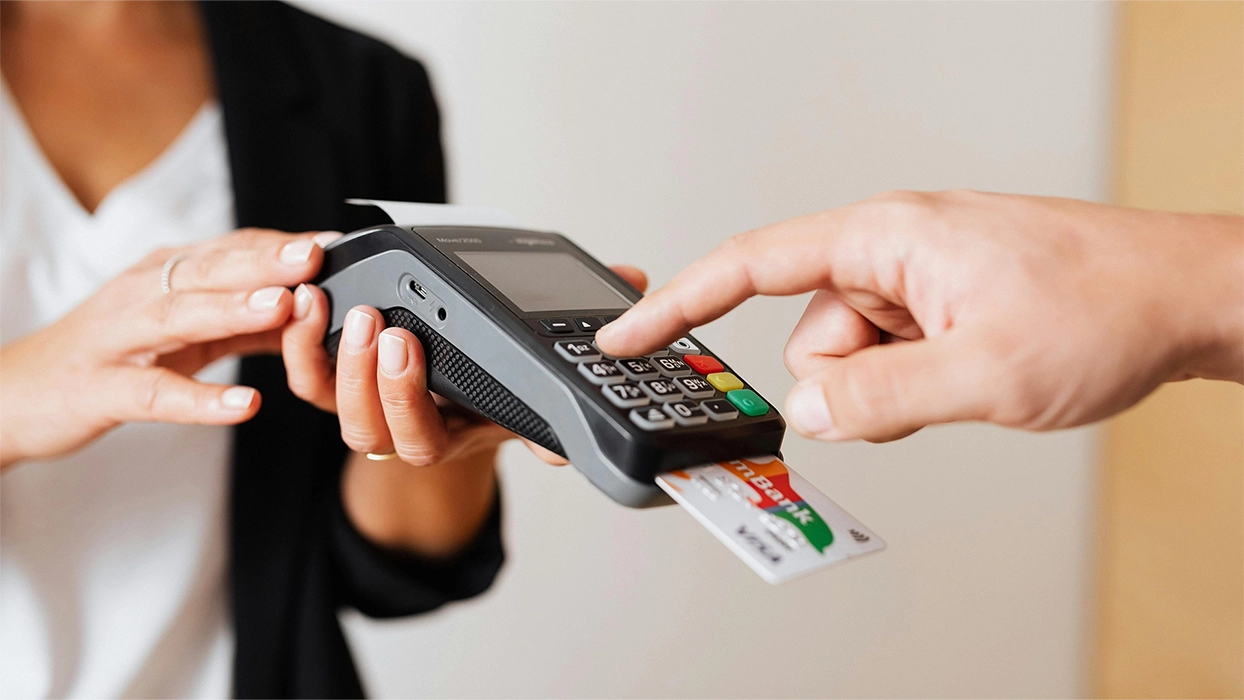In the context of the travel industry, cross-border payments refer to transactions where the customer and merchant are located in different countries.
Cross-border payments in travel are anything but simple. Despite significant technological advances, cross-border payments remain complex and costly, with high fees eroding travel businesses' already narrow margins.
In this article, we explore how cross-border payment processing works, how to manage currency risk, and provide you with tips for choosing the right cross-border payment provider.



How Do Cross-Border Payments Work in the Travel Industry?
Cross-border payments are the process of transferring funds from the sender in one country to the recipient in another. The process involves multiple parties, including the sender, the recipient's bank and one or more intermediary banks, depending on the payment method used.
Here's how cross-border payments work in the travel industry:
- Payment initiation: A customer initiates the payment in one country through their bank.
- Verification: The payment information is sent through an encrypted gateway to get authorization to deduct the money from the sender's bank account.
- Payment routing: The sender's bank routes the payment to the recipient's bank – this can be directly or through one or more intermediary banks, depending on the payment method used.
- Currency conversion: The funds are converted into the recipient's currency using the exchange rate at the time.
- Payment settlement: The recipient's bank receives the funds.
- Fees and charges: Cross-border fees can take the form of transaction fees, currency conversion fees and bank fees, which vary depending on the financial institution and the payment system involved.



The Hidden Costs of Cross-Border Payments
What may appear as a single transaction on the face of it often carries various hidden costs that eat into your company's revenue. Common hidden costs include:
Payment processor fees
You pay payment processing fees to payment processors and financial institutions for handling customer credit or debit card payments, typically ranging from 1.3% to 3.5% of the transaction amount.
Foreign exchange fees
Foreign exchange fees are charged by a bank or payment processor for transactions made abroad, and are typically between 1% and 3% of the transaction value. These fees increase the costs of receiving customer payments and paying your international suppliers.
The true cost of cross-border payment processing
To work out the true cost of a cross-border payment in travel, you need to account for all these fees. Let's demonstrate it with this hypothetical example:
Becky from the US uses her debit card to purchase a $500 USD tour package from a travel company based in the UK. In this example, the exchange rate is $1 USD = £0.80, meaning the booking value in GBP is £400.
Here's how Becky's $500 payment gets diluted by hidden fees in the cross-border payment network:
- The payment processor takes 3.5% of the $500 payment, $17.50, with $482.50 USD remaining.
- The foreign exchange fee charged is 3% of the transaction value, leaving you, the travel provider, with £374.42.
That's over £25 lost to cross-border payment fees. Multiply that across hundreds of bookings, and you've got yourself a significant financial drain.
With Repayd, however, you're in control of cross-border payment processing. We give you the power to optimize your costs by providing access to the lowest fees available, putting more money back in your pocket. You have the flexibility to accept payments from customers in any currency and pay your suppliers in another – all while earning a commission.



How to Manage Currency Risk
Travel businesses face currency risk every time they handle foreign currencies. Exchange rates change constantly, and this volatility has a tangible impact on your profit margins. The good news is that there are ways to protect your finances by managing currency risk.
Here are some of the most effective strategies to get you started:
Forward contracts
Forward contracts are written agreements between two parties that establish a fixed currency exchange rate for a transaction to be completed on a specified future date.
Multi-currency accounts
Holding funds in various currencies means you can receive payments from customers and pay suppliers in their local currencies without undergoing repeated expensive conversions.
At Repayd, we empower your business by combining intelligent cost optimization and preferred agreements to secure favorable FX rates. Paired with our flexible multi-currency accounts, you gain more control over cross-border payment processing.



Fraud Prevention in Cross-Border Travel Payments
The travel industry is a prime target for fraudsters, and travel companies lose over $25 billion to fraud every single year. Fake bookings using stolen credit cards, refund scams, merchant impersonation, and friendly fraud through chargebacks are among the most common fraud methods.
With targets on their backs, travel companies must be proactive in detecting and preventing fraud. So, what can you do to protect your business and your customers?
Real-time transaction monitoring
Finding a cross-border payment processing provider that monitors unusual booking patterns, flags inconsistent customer information, and checks last-minute bookings in real-time helps you protect your customers and your business from fraudsters.
Strong authentication measures
Implementing security tools like two-factor authentication and 3D Secure 2 (3DS2) makes it much harder for fraudsters to succeed.
Fraud detection and prevention are fundamental to what we do at Repayd. Here's how our payment fraud detection and prevention system works:
- Monitoring system: Repayd's fraud monitoring system flags suspicious transactions based on cardholder characteristics.
- Dynamic settings: Dynamic fraud settings, based on your traveler's location, protect your business from international fraudsters.
- Rule settings: Repayd users benefit from specific fraud rule settings, such as transaction velocity checks, developed over many years of processing international travel bookings.
- Fraud specialists: Repayd's dedicated fraud specialists handle fraud and chargeback cases, ensuring your business is protected.



The Regulations Governing Cross-Border Payments
Understanding and navigating the global payment regulations is one of the more complex aspects of cross-border payment processing. An intricate web of compliance requirements, including Anti-Money Laundering (AML) and Know Your Customer (KYC) regulations, governs international transactions to help prevent financial crime.
In Europe, the Payment Services Directive (PSD2), soon to be replaced by PSD3, mandates Strong Customer Authentication (SCA) to boost online payment security. It's worth noting that countries each have their own specific regulations, and this makes staying compliant across different jurisdictions a real challenge. The consequences of non-compliance are severe, and punishments include:
- Reputational damage
- Large fines
- Prosecution
This is precisely why you need to partner with a knowledgeable cross-border payment processing provider. Repayd takes regulatory compliance seriously. We handle the complexities of global payment regulations, so you can focus on what you joined the industry to do: providing people with incredible travel experiences they won't soon forget.



What are the Benefits of Offering Multiple Currencies?
When it comes to paying for trips, 90% of customers want to pay in their own currency. This statistic isn't hard to believe when you think about the benefits of paying in local currency:
A smoother checkout process
Let's face it, paying in a familiar currency is much less confusing and creates a smoother checkout process. No longer will your customers have to turn to currency converters to see how much they’re actually paying.
Price transparency
Because customers are paying in their own currency, they won't have to worry about the nasty surprise that is conversion fees. With one survey revealing that respondents thought price transparency is 16% more important than long-term safety records, displaying prices front and center could be the key to winning new business.
Increases trust
A localized payment experience makes your travel company more trustworthy in the eyes of travelers. When customers see their own currency, it gives them the confidence that they're about to spend their hard-earned money with a legitimate business that cares about customer needs.



How to Choose the Right Cross-Border Payment Partner
When it comes to choosing a cross-border payment partner, there are several key considerations to keep in mind:
Transparent and competitive fees
The cross-border payment processing partner you choose should have a crystal clear fee structure and affordable foreign exchange rates. Better FX rates equal more profit for your business.
Robust security and fraud prevention
Does the partner you're considering use advanced fraud detection tools and adhere to the highest security standards, such as PCI DSS?
Global regulatory compliance
Does the partner in question have a deep understanding of cross-border payment regulations? Choosing the right provider will protect you from potentially costly compliance risks.
Multi-currency capabilities
Do they allow your travel business to accept and manage payments in multiple currencies? You'll need this if you want to accept payments from customers worldwide affordably.
Repayd: The Travel Merchant Account
Cross-border payments in travel used to be complex – we're changing that. With Repayd, you get all of the features above in one easy-to-manage platform. We're the leading merchant account solution for the international travel industry, and our mission is to make payments simple, secure and reliable.
We combine seamless cross-border payment processing with built-in protection – covering chargeback prevention, insolvency cover and risk mitigation through diversified acquiring.
Say goodbye to complicated cross-border payments and sky-high fees that come with them. Contact Repayd today to see how much we can save you on cross-border payments.



